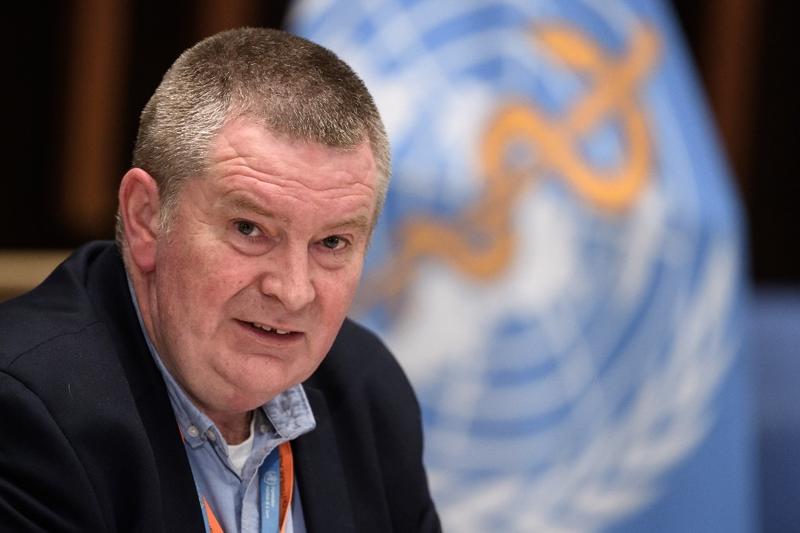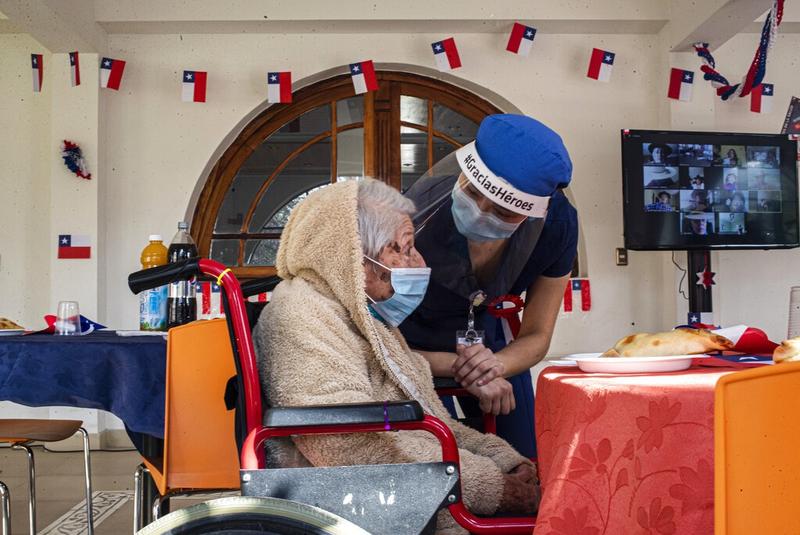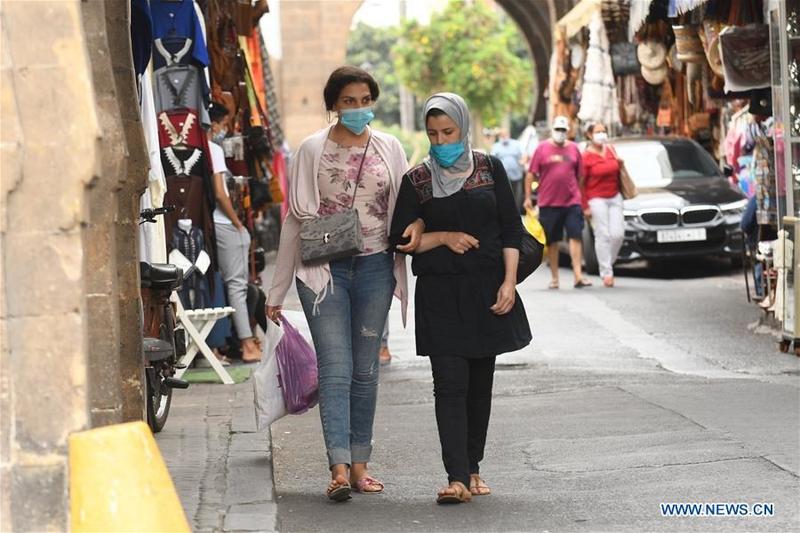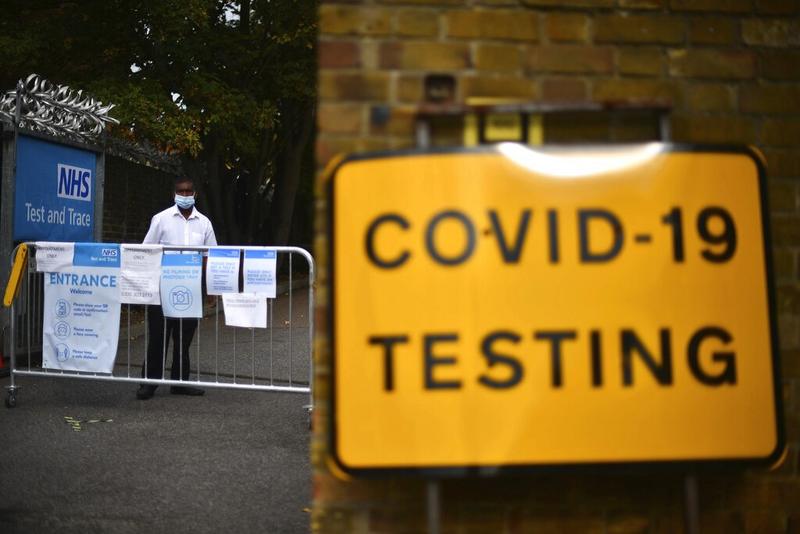 Executive Director of World Health Organization's (WHO) Health Emergencies Programme Mike Ryan attends a press conference organized by Geneva Association of United Nations Correspondents (ACANU) at the WHO's headquarters in Geneva, July 3, 2020.
(FABRICE COFFRINI / POOL / AFP)
Executive Director of World Health Organization's (WHO) Health Emergencies Programme Mike Ryan attends a press conference organized by Geneva Association of United Nations Correspondents (ACANU) at the WHO's headquarters in Geneva, July 3, 2020.
(FABRICE COFFRINI / POOL / AFP)
NEW YORK / MADRID / RIO DE JANEIRO / PARIS / BERLIN / LONDON / CAPE TOWN / PRAGUE / KIEV / ADDIS ABABA / MOSCOW / CAIRO / GENEVA - The World Health Organisation said that more than 170 countries and regions had joined its global plan to distribute vaccines fairly around the world, but cautioned that a race to develop shots could lead to public fears about safety.
“We already face challenges with vaccine acceptance for many proven vaccines,” WHO chief Tedros Adhanom Ghebreyesus said in pre-recorded comments, as he spoke about the push to rapidly develop vaccines.
One in seven cases of COVID-19 reported to the WHO is a health worker and in some countries that figure rises to one in three, the agency said on Thursday.
The WHO called for frontline medical workers to be provided with protective equipment to prevent them from being infected with the novel coronavirus, and potentially spreading it to their patients and families.
“Globally around 14% of COVID cases reported to the WHO are among health workers and in some countries it’s as much as 35%,” Ghebreyesus said.
He added data was limited however and it was hard to know if people were infected at work or in their communities.
The agency's top emergency expert Mike Ryan, when asked about contradictory remarks by US President Donald Trump and US health officials, said that it was important for all countries to have "consistent messaging" for their public.
It is important that we have consistent messaging from all levels, and it's not for one country or one entity; consistent messaging between science and between government.
Mike Ryan, WHO's head of emergencies programme
"It is important that we have consistent messaging from all levels, and it's not for one country or one entity; consistent messaging between science and between government," WHO's Mike Ryan said, adding that authorities must engage with communities to address anxieties.
ALSO READ: WHO chief: No nation can ride out the pandemic until vaccine
"It's understanding the confusion, it's understanding their concern, it's understanding their apprehension. And not laughing at it and not turning that into some kind of political football," he said.
Global tally
Coronavirus cases worldwide neared 30 million on Thursday, surpassing 29.8 million while the global death toll topped 940,000, according to the Center for Systems Science and Engineering (CSSE) at Johns Hopkins University.
Africa tally
The number of confirmed COVID-19 cases recorded across the African continent has reached 1,365,689 while deaths rose to 33,047, the Africa Centers for Disease Control and Prevention (Africa CDC) said on Wednesday.
BioNTech buys factory to boost vaccine capacity
BioNTech SE is buying a German manufacturing site with capacity to churn out 750 million doses a year of its COVID-19 vaccine, more than doubling the amount the company can produce as it prepares to help supply the world with its still-unproven shot.
The site purchase from Swiss pharma giant Novartis AG shows the German biotech’s confidence in the experimental vaccine it’s developing together with US partner Pfizer Inc and China’s Shanghai Fosun Pharmaceutical Group Co. The site will enable BioNTech to ramp up production more quickly than if it had relied on expanding existing sites, as it had originally planned, Chief Executive Officer Ugur Sahin said in an interview late on Wednesday.
BioNTech and Pfizer expect to get initial data next month from a 44,000-person study showing whether the vaccine works.
BioNTech expects that the vaccine it is developing with Pfizer can be stored at refrigerator temperatures for at least two weeks, seeking to allay concerns that the compound may have to be deep-frozen.
AstraZeneca's halted trial
The adverse events that led to a pause in trials evaluating AstraZeneca Plc's COVID-19 vaccine candidate may not have been associated with the vaccine itself, according to a document outlining participant information that was posted online by the Oxford University.
Enrollment in the British drugmaker’s global trials of the vaccine, which it is developing with researchers at Oxford University, was paused on Sept 6, after a participant in its UK trial had a serious side effect thought to be a rare spinal inflammatory disorder called transverse myelitis.
Safety reviews were conducted when volunteers in the trials for testing the vaccine candidate, called AZD1222 or ChAdOx1 nCoV-19, developed unexplained neurological symptoms including changed sensation or limb weakness, and the study was paused while a safety review took place, according to the document.
“After independent review, these illnesses were either considered unlikely to be associated with the vaccine or there was insufficient evidence to say for certain that the illnesses were or were not related to the vaccine,” the document said.
The vaccine trials have resumed in Britain, Brazil and South Africa, but not yet in the United States.
Lilly antibody drug
Eli Lilly and Co said Wednesday a single infusion of its experimental antibody treatment reduced the need for hospitalization and emergency room visits for clinical trial patients with moderate COVID-19.
The company said it will discuss the interim results, which have not yet been reviewed by outside experts, with global regulators. A Lilly spokeswoman said discussions with the US Food and Drug Administration are expected to range from additional clinical trials to the possibility of an emergency use authorization.
The mid-stage study tested three different doses of LY-CoV555, a manufactured copy of a an antibody produced by a patient who recovered from COVID-19
Of the total 302 patients treated with the Lilly drug, five or 1.7 percent had to be hospitalized or required an emergency room visit. That compared with 6 percent in the placebo group, Lilly said.
Austria
Austria is banning indoor meetings of more than 10 people from Monday after bars, clubs and private parties have turned into a major driver of new infections. “We are noticing that we have an exponential increase of infections,” Chancellor Sebastian Kurz told journalists in Vienna. “We have to react now to avoid a second lockdown.”
Mask requirements are also widened to include markets and religious services and now have to be worn in restaurants while not seated, Kurz said. The 7-day average of daily new infections has risen for 12 straight days and more than doubled in that period to 658 as of Thursday. The number of active virus cases passed 7,000, a level last seen during the lockdown in April.
Belarus
Belarus reported 224 new confirmed COVID-19 cases on Thursday, taking the nationwide count to 74,987, according to the country's health ministry.
There have been 157 new recoveries in the past 24 hours, bringing the total to 72,967, the ministry added.
So far, 771 people have died of the disease in the country, including four over the past 24 hours, it said.
Belarus is considering conducting a 100-person trial of Russia's COVID-19 vaccine, the health ministry said on Thursday, adding that potential participants can now apply online at eight local clinics that have been selected to conduct the trial.
The trial, one of several that Russia hopes to conduct abroad, is still pending regulatory approval, the ministry said, adding it had received paperwork from Russia and was inspecting it.
Brazil
The swearing-in ceremony of Brazil’s chief justice last week is emerging as a potential new cluster of coronavirus infections in the country, one of the hardest-hit by the pandemic.
Lower house Speaker Rodrigo Maia was diagnosed Wednesday, becoming the fifth senior government official to test positive for COVID-19 after attending the event. Maia attended the Sept 10 swearing-in ceremony of Supreme Court Chief Justice Luiz Fux, who tested positive for COVID-19 earlier this week. Another three high ranking federal judges were infected.
Brazil on Wednesday registered 987 additional deaths, the health ministry said, bringing the total death toll to 134,106. Cases rose by 36,820 to a total of 4,419,083.
The state of Sao Paulo, the epicenter of the country's outbreak, will allow amusement parks to reopen on Sept 23 with social distancing measures in place, officials said.
 An employee chats with a resident who had been infected with the new coronavirus ahead of festivities marking Independence Day with other recovered residents, at a nursing home in Santiago, Chile, Sept 16, 2020. (ESTEBAN FELIX / AP)
An employee chats with a resident who had been infected with the new coronavirus ahead of festivities marking Independence Day with other recovered residents, at a nursing home in Santiago, Chile, Sept 16, 2020. (ESTEBAN FELIX / AP)
Chile
Chile's health minister has urged Chileans to celebrate the country's independence day holiday on Friday "prudently" amid fears that a special permit allowing people to hold and attend family gatherings could result in a spike in coronavirus cases.
The day is normally marked by exuberant communal fairs. This year, as Chile seeks to maintain an upper hand over the virus, the authorities have canceled the fairs. But Chileans can apply for a special 'party at home' permit from police that allows a household to host an additional five people for up to six hours. The permit will only be granted to people in communities out of full lockdown.
On Wednesday, Chile recorded the lowest number of deaths in 90 days. Overall, it has had 12,058 COVID-19 deaths, according to a tally by Johns Hopkins University. The number of confirmed cases stood at 439,287.
Czech Republic
The Czech Republic reported on Thursday more than 2,000 new COVID-19 cases in a single day for the first time as it battles a surge in infections that is among the fastest in Europe.
The health ministry recorded 2,139 cases of the new coronavirus on Wednesday, up from a previous record 1,675 reported for the previous day.
Due to the rise, the government has tightened mask wearing rules and restricted bars' opening hours. On Wednesday, the Health Ministry said it would ban stand-up indoor events from Friday evening, also affecting bars and restaurants where customers cannot exceed seating capacity.
Since the start of the outbreak, the central European country has reported 41,032 cases, including 22,931 recoveries and 482 deaths.
Egypt
Egypt reported 160 new COVID-19 infections late on Wednesday, bringing the total caseload to 101,500.
The death toll rose to 5,696 after another 17 people died while the number of recoveries increased by 804 to 86,549, said Khaled Megahed, spokesman for the the Health Ministry, in a statement.
France
Several hundred workers at COVID-19 testing laboratories across France walked out on Thursday in protest against poor working conditions, one of the country’s biggest trade unions said, piling more strain on a system under severe stress.
The number of French people treated in intensive care units for COVID-19 rose for the twentieth straight day on Wednesday to a three-month high of 803, while the number of new daily cases was the third highest on record.
The virus is here to stay for months, it will circulate everywhere in Europe and especially in France.
Emmanuel Macron, French president
French health authorities reported 9,784 new infections, just below the 10,561 daily all-time high reached on Saturday, bringing the cumulative number of cases to 404,888, the second highest tally in Western Europe behind Spain.
French President Emmanuel Macron said the virus was circulating "quicker and quicker in certain parts of the country". "The virus is here to stay for months, it will circulate everywhere in Europe and especially in France," he said, adding that health rules must be obeyed to protect lives.
READ MORE: Europe virus stars scramble after declaring victory too fast
The number of people in ICUs is still almost nine times lower than the April 8 peak of 7,148, but the upward trend is putting a renewed strain on the hospital system in certain parts, such as Marseille. The total figure for COVID-19 hospitalisations increased by 140 to 5,819
Deaths rose by 46 to 31,045.
Germany
There were 1,855 new cases in Germany during the 24 hours through Thursday morning, according to data from Johns Hopkins University, the highest daily increase since Sept 8. It brought the tally to 266,869, while fatalities increased by 6 to 9,373.
According to data from the Robert Koch Institute (RKI) for infectious diseases, the number of confirmed cases increased by 2,194 to 265,857, while deaths rose by three to 9,371.
The infection rate dropped to the key threshold of 1.0, according to the RKI.
Germany has added Austria's capital Vienna and Hungary's capital Budapest to its pandemic risk list due to the rising number of coronavirus infections there, authorities said on Wednesday. The Hauts-de-France region in France as well as the Fribourg canton in Switzerland have also been added to the list, the RKI said.
Ireland
There are indications the coronavirus is spreading exponentially in Ireland, an official said Wednesday.
Irish health ministry adviser Philip Nolan told reporters in Dublin he was “more concerned” than any time since April, as the country sees a surge in infections.
Ireland is now seeing about 54 cases per 100,000 of population versus three at the end of June, while hospitalizations are rising. The virus is now concentrated in Dublin, Nolan said.
Ireland reported 254 more virus cases Wednesday, with three deaths.
ALSO READ: Ireland sets new rules for quarantine-free travel
Italy
Italy could have its first shots of British drugmaker AstraZeneca's potential COVID-19 vaccine by the end of November, the managing director of IRBM told Reuters.
Biotech firm IRBM, whose lab is based south of Rome, is cooperating with AstraZeneca in developing a vaccine for the disease which has caused more than 35,600 deaths in Italy.
"It is possible to have the first shots in Italy by the end of November, provided the trial continues as planned and the vaccine is validated," Matteo Liguori said on Wednesday.
Italy's Health Minister had already said the vaccine could be available by the end of 2020.
Italy has so far reported 291,442 confirmed cases and 35,645 deaths, according to a tally by Johns Hopkins University.
READ MORE: WHO warns Europeans of more COVID-19 deaths
Kenya
Kenya's Ministry of Health reported 92 new COVID-19 cases on Wednesday, bringing the total number of confirmed cases to 36,393.
Mercy Mwangangi, health chief administrative secretary, said recoveries rose by 165 to 23,529 while deaths increased by three to 637.
Also on Wednesday, the government added Tanzania to the list of countries in which international air services can be resumed.
Mexico
Mexico confirmed an additional 4,444 confirmed cases of coronavirus in the country and 300 more deaths on Wednesday, bringing the totals to 680,931 cases and 71,978 deaths.
 People wearing face masks walk on a street in Casablanca, Morocco, on Sept 16, 2020. (CHADI / XINHUA)
People wearing face masks walk on a street in Casablanca, Morocco, on Sept 16, 2020. (CHADI / XINHUA)
Morocco
Morocco reported 1,692 new COVID-19 cases and 38 more deaths on Wednesday, raising the tally of infections to 92,016 and the death toll to 1,686.
The total number of recoveries increased by 1,921 to 72,968 after 1,921 new ones were added, said the Ministry of Health in a statement.
Romania
Romania on Wednesday reported 1,713 new COVID-19 infections, its highest single-day increase since the outbreak began, bringing the tally to 107,011.
Another 49 people died in the past 24 hours, bringing the death toll to 4,285, according to the Strategic Communication Group (GCS), the official novel coronavirus communication task force.
Russia
Russia's death toll from the novel coronavirus passed 19,000 on Thursday, as the country reported 144 new deaths in the previous 24 hours.
The country's coronavirus crisis response centre registered 5,762 new cases, bringing its nationwide tally of infections to 1,085,281, the world's fourth-highest caseload.
The death toll now stands at 19,061.
Slovenia
In Slovenia, which confirmed 104 new cases on Thursday, the government is limiting working hours for bars and restaurants to 6:00 a.m. until 10:00 p.m.. Masks, which are already mandatory in closed public spaces, will also have to be worn in crowded open spaces, such as markets and city centers. Employers will need to measure temperature of their workers and visitors.
South Africa
South African President Cyril Ramaphosa on Wednesday further eased COVID-19 restrictions in the country, allowing limited international travel, among others.
The current level-two lockdown will be moved to level one, starting from Sept 21, Ramaphosa said in a televised address. South Africa will gradually and cautiously ease restrictions on international travel starting from Oct 1, he said.
Meanwhile, Ramaphosa said "the country is participating in a global initiative supported by the World Health Organization to pool resources for the development and distribution of a vaccine". The country is also investing in its own capacity to produce and distribute a vaccine locally, said Ramaphosa.
As of Wednesday, the country has recorded 653,444 confirmed cases and 15,705 deaths, according to the Department of Health.
 People wearing face masks to prevent the spread of the coronavirus walk in downtown Madrid, Spain, Sept 16, 2020. (MANU FERNANDEZ / AP)
People wearing face masks to prevent the spread of the coronavirus walk in downtown Madrid, Spain, Sept 16, 2020. (MANU FERNANDEZ / AP)
Spain
Spain is struggling to control a fresh outbreak as infections in Madrid spiked.
Madrid's deputy health chief Antonio Zapatero said "action" was needed to stop the number of new cases spiraling out of control
The health ministry registered on Wednesday 4,728 new infections in the last 24 hours, including 1,854 in Madrid. That was up from 3,022 cases reported on Tuesday and brings the cumulative tally to 614,360 - Western Europe's highest. With 17 more deaths, Spain's death toll has reached 30,243.
Madrid's deputy health chief Antonio Zapatero told the press that "action" was needed to stop the number of new cases spiraling out of control.
According to the Spanish Health Ministry, the Comunidad de Madrid -- which includes the capital and the surrounding towns and villages -- has seen 21,131 new cases over the last week and 42,844 over the past fortnight. The incidence of the virus has been at 651.50 cases per 100,000 inhabitants over the past two weeks.
Zapatero said the measures could include "selective lockdown" within neighborhoods with the highest rates of infection.
Tunisia
Tunisia's health ministry has reported 477 new positive COVID-19 cases and six additional deaths, according to an official statement released Wednesday night.
The daily epidemiological report showed that the total number of COVID-19 cases in Tunisia has risen to 8,100, including 129 deaths.
A total of 2,309 patients had recovered while there are still 5,662 active cases.
 A member of staff stands at the entrance to a coronavirus testing center in Newham, east London, Sept 16, 2020. (VICTORIA JONES / PA VIA AP)
A member of staff stands at the entrance to a coronavirus testing center in Newham, east London, Sept 16, 2020. (VICTORIA JONES / PA VIA AP)
UK
Britain can avoid further local restrictions and another national lockdown by sticking to the rules such as not meeting in groups of more than six people, junior health minister Edward Argar told the BBC on Thursday.
On COVID-19 tests, Argar said separately on Sky News that Britain faces difficulties in carrying out tests due to shortages of lab capacity.
British Prime Minister Boris Johnson has said that he wants to boost testing to 500,000 a day by the end of October to avoid a second national lockdown despite rising case numbers.
Britain recorded 3,991 new positive cases of COVID-19, government data showed on Wednesday, the highest daily figure for new cases since May 8.
The new cases took the tally to 378,219, according to government data. There were a further 20 deaths from COVID-19, according to figures that show fatalities within 28 days of a first positive test.
Ukraine
Ukraine set a daily record with 3,584 new coronavirus infections, the national security council said on Thursday, up from a figure of 3,144 on Sept 11.
Ukraine has a total of 166,244 cases, with 3,400 deaths and 73,913 recoveries, the council added.
US
Hawaii Governor David Ige said on Wednesday the state’s pre-travel testing progam would give travelers the option of potentially avoiding a 14-day quarantine period on arrival from next month.
The pre-travel testing option, which begins on Oct. 15, is seen as one of the key measures for revitalizing state's tourism-focused economy, while providing protection for the spread of COVID-19, according to a statement from the governor's office.
Speaking at a press conference, President Donald Trump said a vaccine could be distributed widely to the public as early as October, contradicting statements by some of his top health officials that ranged between the end of March and the end of 2021.
Director of the US Centers for Disease Control and Prevention (CDC) Robert Redfield had said earlier at a Senate Appropriations subcommittee hearing that it would be the late second quarter or third quarter of 2021 before a COVID-19 vaccine is generally available to the American public.
The US government said it will start distributing a COVID-19 vaccine within one day of regulatory authorization as it plans for the possibility that a limited number of vaccine doses may be available at the end of the year
Trump said earlier comments by Redfield were “a mistake.” “I think he misunderstood the questions,” Trump said.
Earlier on Wednesday, the US government said it will start distributing a COVID-19 vaccine within one day of regulatory authorization as it plans for the possibility that a limited number of vaccine doses may be available at the end of the year.
According to documents released by the Department of Health and Human Services and the Department of Defense, limited COVID-19 vaccine doses may be available by early November 2020 if one is authorized by then, but that supply may increase substantially in 2021. Officials also said they were working to make sure there was no cost to patients for the vaccine.
The US has so far reported more than 6.6 million confirmed cases and more than 196,000 deaths, according to a tally by Johns Hopkins University.
READ MORE: NY lockdown cut spread by 70 percent, study finds
Admiral Brett Giroir, assistant secretary for health at the US Department of Health and Human Services, said at the same hearing attended by Redfield that the US could have a capacity of 3 million coronavirus tests per day this month, and scale up to a high of as much as 135 million tests a month by October.


